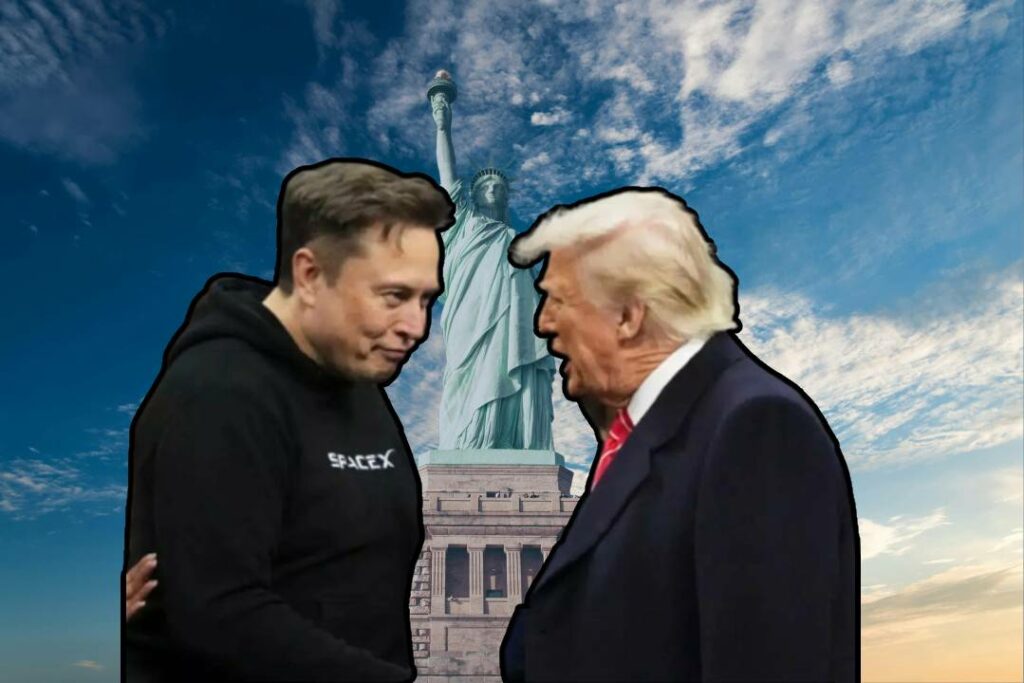
- One of the reasons Musk officially gave for supporting Trump’s presidential bid was that the United States is going through an existential crisis.
- Despite possibly having good intentions, it must be remembered that Musk is not an elected representative, and regardless of how influential or wealthy he is, he cannot interfere in constitutional matters.
- Musk criticised Trump’s tariff measures, claiming they were pushing the U.S. toward a recession.
- The Elon Musk-Trump saga paints a grim picture of American democracy — one where power and privilege overshadow the voice of the people.
Elon Musk, a billionaire, made political headlines last year by openly endorsing the presidential campaign of President Trump. He spent more than $200 million on Trump’s campaign and was one of the key figures in the election effort. He helped President Trump sweep several swing states, especially high-stakes venues like Pennsylvania. His involvement made Trump’s campaign appear almost one-sided.
Why did the richest man on Earth choose to support President Trump? What might be his intentions? Some have even raised concerns about Musk’s close access to President Trump, claiming that Elon Musk, being an unelected individual, having such influence over an elected representative, poses a threat to democracy.
One of the reasons Musk officially gave for supporting Trump’s presidential bid was that the United States is going through an existential crisis. He claimed that the Democrat-led administration had significantly deteriorated the condition of the country, and at such a critical time, someone was needed to recover it. However, it became clear that Musk entered politics to pursue his own interests. His closeness with Trump was meant to ensure that his economic aspirations, especially regarding Starlink and Tesla, were fulfilled.
Musk was given the responsibility of reforming the U.S. bureaucracy and federal institutions. He accused these institutions of creating economic burdens for the American treasury and emphasised the need for transparency. He promised to invest billions in reforms. However, while working on these reforms, Musk was reportedly given access to key constitutional institutions and sensitive information, leading to concerns that he was trying to hijack these institutions. Despite possibly having good intentions, it must be remembered that Musk is not an elected representative, and regardless of how influential or wealthy he is, he cannot interfere in constitutional matters.
Clearly, one of Musk’s main intentions was to seek economic favours. However, his political ties with Trump backfired, as they alienated the liberal and Democratic sections of the American population. This led to a systematic campaign against Musk and his companies. Public protests against Tesla affected not only the company’s profits but also Musk’s overall wealth since Trump’s return to power.
Differences also began to emerge between Musk and Trump, particularly regarding Trump’s tariff measures. Musk was against these tariffs, especially those imposed on China, as Tesla operates major factories there. The friction became public when Treasury Secretary Bessent clashed with Musk over tariff policies. For Musk, this issue was crucial because these tariffs could negatively impact Tesla’s operations in China.
Another point of disagreement involved NASA appointments. Since Musk owns SpaceX, he wanted someone favourable to his business interests as NASA’s head. However, the individual Musk supported was a Democrat whom Trump opposed.
The biggest clash between Musk and Trump, however, came over the “Big Beautiful Bill,” a major spending bill. Musk wanted more subsidies for electric vehicles, while Trump argued that subsidies should not be limited to EVs alone but should also support gasoline and hybrid cars. This marked the beginning of a public war of words between them. Musk criticised Trump’s tariff measures, claiming they were pushing the U.S. toward a recession. He also opposed Trump’s spending priorities, accusing him of creating more debt for the country.
Musk even suggested that there should be a third political party in the U.S. The most controversial moment came when Musk accused President Trump of being involved in the Epstein files, stating that the administration was deliberately withholding them. However, two days later, Musk apologised for the comment, calling it extreme and saying he should not have made such a statement. Trump accepted the apology, and although the two have not spoken since, there seems to be a mutual understanding to halt the public conflict.
But the bigger issue is not their differences. The real concern is how an unelected individual like Musk can hold such influence over an elected president. One comment from Musk can create political instability in the U.S. This marks a new low for American democracy and reflects how it is becoming a playground for oligarchs. One billionaire can invest hundreds of millions to influence a presidential campaign and later openly criticise the president.
This situation reveals that American governance is no longer solely about serving the people but increasingly about serving powerful individuals. The rise of such influence should concern every citizen. No matter how wealthy or prominent Musk may be, he is ultimately a citizen and must comply with the democratic system. This episode paints a grim picture of American democracy — one where power and privilege overshadow the voice of the people.
Aayush Pal is a freelance writer on contemporary geopolitical developments. The views expressed in his work are entirely his own.
